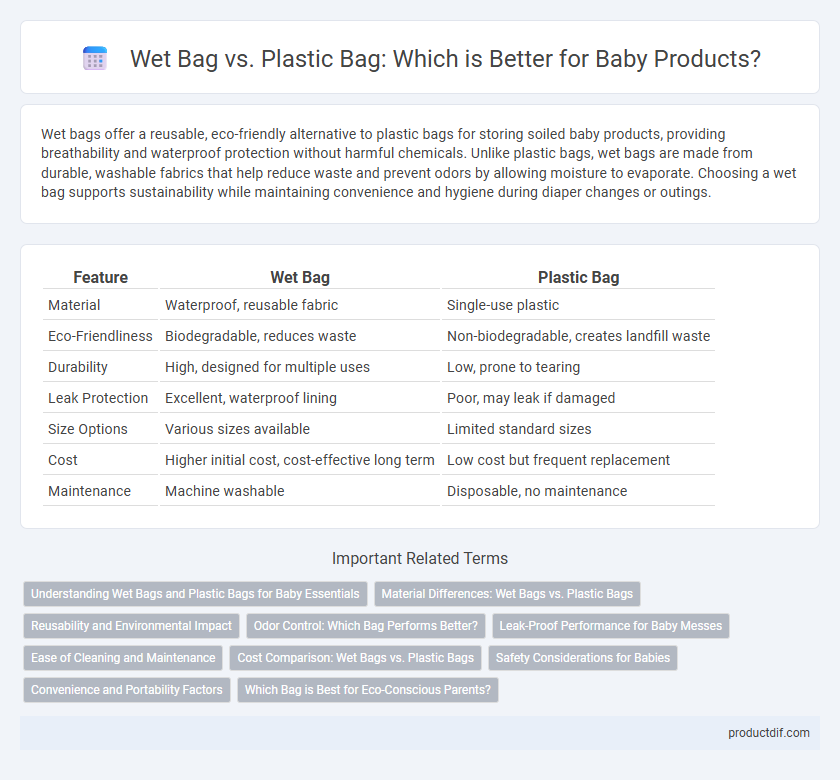Wet bags offer a reusable, eco-friendly alternative to plastic bags for storing soiled baby products, providing breathability and waterproof protection without harmful chemicals. Unlike plastic bags, wet bags are made from durable, washable fabrics that help reduce waste and prevent odors by allowing moisture to evaporate. Choosing a wet bag supports sustainability while maintaining convenience and hygiene during diaper changes or outings.
Table of Comparison
| Feature | Wet Bag | Plastic Bag |
|---|---|---|
| Material | Waterproof, reusable fabric | Single-use plastic |
| Eco-Friendliness | Biodegradable, reduces waste | Non-biodegradable, creates landfill waste |
| Durability | High, designed for multiple uses | Low, prone to tearing |
| Leak Protection | Excellent, waterproof lining | Poor, may leak if damaged |
| Size Options | Various sizes available | Limited standard sizes |
| Cost | Higher initial cost, cost-effective long term | Low cost but frequent replacement |
| Maintenance | Machine washable | Disposable, no maintenance |
Understanding Wet Bags and Plastic Bags for Baby Essentials
Wet bags are reusable, waterproof pouches designed to store damp baby essentials like cloth diapers and swimsuits, offering breathability and eco-friendly convenience. Plastic bags, often single-use, provide waterproof protection but lack durability and contribute to environmental waste. Choosing wet bags supports sustainability, reduces plastic pollution, and ensures better odor control and moisture containment for baby items.
Material Differences: Wet Bags vs. Plastic Bags
Wet bags are typically made from durable, waterproof fabrics such as PUL (polyurethane laminate) or TPU (thermoplastic polyurethane), which provide breathability and prevent leaks while being reusable and eco-friendly. In contrast, plastic bags are usually made from polyethylene, which is non-breathable, single-use, and prone to tearing, environmental pollution, and chemical leaching. The material differences highlight wet bags as a sustainable choice for containing wet or soiled baby items, offering enhanced durability and safety compared to disposable plastic bags.
Reusability and Environmental Impact
Wet bags offer superior reusability compared to plastic bags, as they are made from durable, waterproof materials designed for multiple uses. Unlike single-use plastic bags that contribute significantly to environmental pollution and landfill waste, wet bags reduce plastic consumption and lower carbon footprints. Their eco-friendly design supports sustainable parenting by minimizing plastic waste and promoting long-term usage.
Odor Control: Which Bag Performs Better?
Wet bags outperform plastic bags in odor control due to their waterproof and breathable materials, such as TPU-lined polyester, which effectively trap moisture while reducing bacteria growth. Plastic bags tend to retain unpleasant smells because they lack ventilation, causing trapped odors to intensify over time. Parents seeking odor-free storage for diapers and baby clothes benefit significantly from using wet bags with antimicrobial properties and odor-blocking fabrics.
Leak-Proof Performance for Baby Messes
Wet bags offer superior leak-proof performance compared to traditional plastic bags, making them ideal for containing baby messes such as diapers, wipes, and clothing. Made from waterproof materials with sealed seams, wet bags prevent liquids and odors from escaping, ensuring a hygienic and mess-free solution. Unlike single-use plastic bags, wet bags are reusable, durable, and eco-friendly, providing reliable protection against leaks during travel or daily outings.
Ease of Cleaning and Maintenance
Wet bags made from waterproof, breathable materials like TPU-coated polyester are easier to clean and maintain than plastic bags, as they can be machine-washed and reused without retaining odors. Plastic bags often trap moisture and bacteria, leading to unpleasant smells and requiring frequent replacement. Choosing wet bags promotes hygiene, sustainability, and convenience for parents managing baby products.
Cost Comparison: Wet Bags vs. Plastic Bags
Wet bags, made from durable, reusable materials like polyester with waterproof lining, typically have a higher upfront cost ranging from $8 to $20 each but offer long-term savings by reducing the need to purchase disposable plastic bags frequently. Plastic bags, costing only a few cents per use, accumulate significant expenses over time as they require constant replacement and contribute to environmental waste. Investing in wet bags results in greater cost efficiency and eco-friendliness for parents managing diaper changes and baby-related messes.
Safety Considerations for Babies
Wet bags made from BPA-free, non-toxic, and waterproof materials provide a safer alternative to traditional plastic bags, preventing chemical exposure and reducing the risk of suffocation for babies. These breathable, reusable bags help maintain hygiene by containing wet or soiled items securely while minimizing bacterial growth compared to single-use plastic bags. Parents prioritizing baby safety should choose wet bags that comply with stringent health standards to ensure chemical-free, environmentally friendly storage solutions.
Convenience and Portability Factors
Wet bags made from waterproof fabrics offer superior convenience and portability compared to traditional plastic bags by securely containing moisture and odors from baby items like cloth diapers and clothing. Their lightweight, reusable design fits easily into diaper bags or strollers, reducing waste and making them ideal for on-the-go parents. Unlike plastic bags, wet bags often feature leak-proof zippers and easy-to-clean materials, enhancing hygienic storage and effortless transport during outings.
Which Bag is Best for Eco-Conscious Parents?
Wet bags made from durable, washable materials like PUL or polyester are the best choice for eco-conscious parents seeking sustainable alternatives to single-use plastic bags. These reusable bags reduce waste, prevent leaks, and are specifically designed for containing wet or soiled baby items, promoting environmentally friendly parenting habits. Unlike plastic bags, wet bags can be easily cleaned and reused multiple times, significantly minimizing plastic pollution.
Wet Bag vs Plastic Bag Infographic

 productdif.com
productdif.com